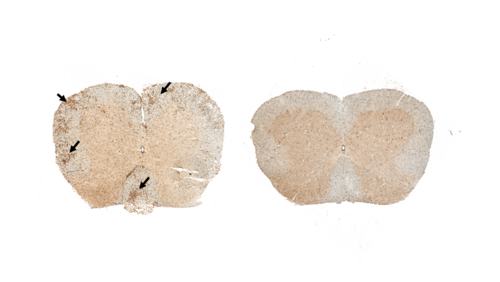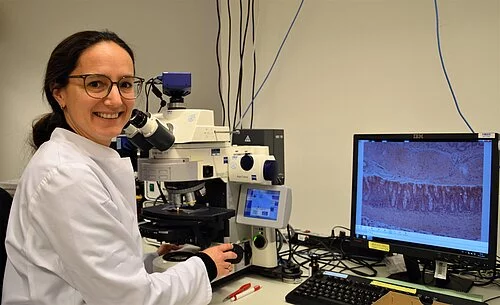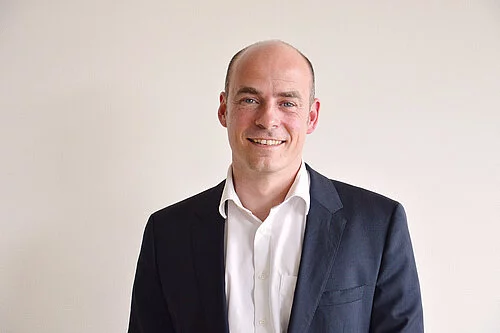Intestinalbacteriacouldinfluencethedevelopmentofmultiplesclerosis
Atryptophan-freedietinmicechangesthecompositionoftheintestinalbacteriaandprotectsagainstsymptomsofexperimentallygeneratedmultiplesclerosis
Tryptophanisanessentialaminoacid,i.e.aproteincomponentwhichcannotbeproducedbythebodyitself,butmustbeobtainedfromthediet.Metabolicproductsoftryptophanserveaschemicalmessengersfornumerousimportantbodilyfunctions.Theycontrolspecificimmunecells,forexample,orhelptostrengthentheintestinalbarrier.Adietwhichspecificallyomitstryptophanaltersthecompositionoftheintestinalbacteriainmice,andsurprisinglyresultsintheanimalsnotdevelopingsymptomsofmultiplesclerosis(MS).ThishasbeendemonstratedbyscientistsfromtheClusterofExcellence"PrecisionMedicineinChronicInflammation"attheInstituteofClinicalMolecularBiology(IKMB)atKielUniversity(CAU),incooperationwiththeGermanCancerResearchCenter(DeutschesKrebsforschungszentrum,DKFZ)inHeidelberg.TheresearchersrecentlypublishedtheirworkintherenownedscientificjournalNatureCommunications.
Multiplesclerosis(MS)isachronicinflammatoryneurodegenerativediseaseofthecentralnervoussystem.WithMS,theownimmunesystemattackstheinsulationofnervefibersinthecentralnervoussystem,andgraduallydestroysthem.Thisdisturbsthetransmissionofsignalsinthenerves.Overtime,thesechangescandisruptthemotorfunctionsorsensoryperceptionofthoseaffected.Previousstudiessuggestedthatacombinationofgeneticpredispositionandenvironmentalfactorscausesthedisease.
TheresearchbyDr.MarenFalk-PaulsenandProfessorPhilipRosenstielfromtheInstituteofClinicalMolecularBiology(IKMB)atKielUniversity(CAU),incooperationwithateamledbyProfessorMichaelPlattenfromtheDKFZinHeidelberg,showsthattheintestinalmicrobiome,i.e.thetotalityofthebacteriainthegut,couldalsoplayanimportantrole.Theyusedamousemodelofmultiplesclerosis,inwhichthebody'sownimmunecellsattackaspecificenvelopeproteinofthenerveinsulationinthecentralnervoussystem,andtherebycausetypicalMSsymptoms.However,micethatreceivedaspecialdietinwhichtheaminoacidtryptophanwasmissing,didnotdevelopanyMSsymptomsinthismodel.Inthesemice,theaggressiveimmunecellsdidnotenterthespinalcord.Thisprotectiveeffectwasdependentonthepresenceofcertainbacteriainthegut-iftheseweremissing,thentheprotectionagainstMSalsodisappeared.
"Byomittingtheaminoacidtryptophan,thecompositionoftheintestinalbacteriachanges,whichsendsasofarunknownsignaltotheimmunecells.Wedonotyetknowwhichmechanismsarebehindthisphenomenon.Wewanttoexaminethismorecloselyinfuture,"saidDr.MarenFalk-Paulsen,researcherattheIKMBandmemberoftheClusterofExcellencePMI.
ScientistsfromtheClusterofExcellencePMIattheIKMBledbyProfessorPhilipRosenstielhavealreadybeenresearchinghowtryptophaninfluencestheintestinalmicrobiomeandchronicinflammationforalongtime."Inpreviouswork,wehavebeenabletoshowhowtryptophanaffectsinflammationsinthegut,"explainedProfessorRosenstiel,directorattheIKMBandboardmemberoftheClusterofExcellencePMI."Nowwehaveshownthattheomissionoftryptophanalsoaffectsinflammatoryreactionsinotherpartsofthebody,andthisviaamechanismindependentofthepreviouslyknownsignalingpathways.Basedonourresults,wehopetofindanewtargetfortreatingMSinfuture,"addedRosenstiel.
Originalpublication:
JanaK.Sonner*,MelanieKeil*,MarenFalk-Paulsen*,,PhilipRosenstiel&MichaelPlatten:DietarytryptophanlinksencephalogenicityofautoreactiveTcellswithgutmicrobialecology.Naturecommunication(2019).(*Theauthorscontributedequallytothepublication)DOI:10.1038/s41467-019-12776-4
Scientificcontact
Dr.MarenFalk-Paulsen
InstituteofClinicalMolecularBiology(IKMB),CAU,UKSH
+49(0)43150015133
m.paulsen@ikmb.uni-kiel.de
Prof.Dr.PhilipRosenstiel
InstituteofClinicalMolecularBiology,CAU,UKSH
+49(0)43150015111
p.rosenstiel@mucosa.de
InmicewithMSsymptoms,thespinalcordisseverelyinflamed.Thisbecomesclearunderthemicroscope,throughthedetectionofspecializedinflammatorycells(imageontheleft,indarkbrownandmarkedwitharrows).Atryptophan-freedietpreventsthisinfiltrationofinflammatorycellsintothespinalcord(imageontheright).
Dr.MarenFalk-Paulsen,memberoftheClusterofExcellence"PrecisionMedicineinChronicInflammation"(PMI)andresearcherattheInstituteofClinicalMolecularBiology(IKBM),CAU,UKSH.
AbouttheClusterofExcellencePMI
TheClusterofExcellence"PrecisionMedicineinChronicInflammation"(PMI)isbeingfundedfrom2019to2025throughtheGermanExcellenceStrategy(ExStra).Itsucceedsthe"InflammationatInterfacesCluster,whichwasalreadyfundedintwoperiodsoftheExcellenceInitiative(2007-2018).Around300membersfromeightinstitutionsatfourlocationsareinvolved:Kiel(KielUniversity,UniversityMedicalCenterSchleswig-Holstein(UKSH),MuthesiusUniversityofFineArtsandDesign,KielInstitutefortheWorldEconomy(IfW),LeibnizInstituteforScienceandMathematicsEducation(IPN)),Lbeck(UniversityofLbeck,UniversityMedicalCenterSchleswig-Holstein(UKSH)),Pln(MaxPlanckInstituteforEvolutionaryBiology)andBorstel(ResearchCenterBorstel-LeibnizLungCenter).
Thegoalistotranslateinterdisciplinaryresearchfindingsonchronicinflammatorydiseasesofbarrierorganstohealthcaremoreintensively,aswellastofulfilpreviouslyunsatisfiedneedsofthepatients.Threepointsareimportantinthecontextofsuccessfultreatment,andarethereforeattheheartofPMIresearch:theearlydetectionofchronicinflammatorydiseases,thepredictionofdiseaseprogressionandcomplications,andthepredictionofindividualresponsestotreatment.
Pressoffice
fbuhse@uv.uni-kiel.de+49(0)431/8804682https://precisionmedicine.de
ClusterofExcellence "PrecisionMedicineinChronicInflammation"
ScientificOffice
Head:Dr.habil.SusanneHolsteinPostal
Christian-Albrechts-Platz4,24118Kiel,Germany
Contact:SonjaPetermann
 +49(0)431880-4850,fax:+49(0)431880-4894
spetermann@uv.uni-kiel.de
Twitter:PMI@medinflame







